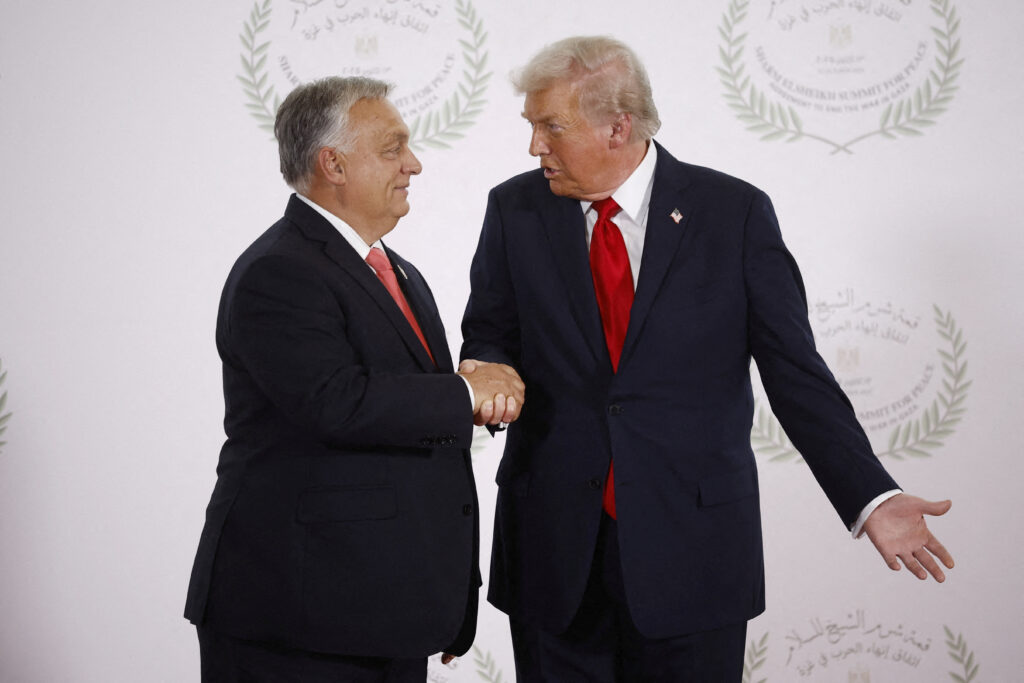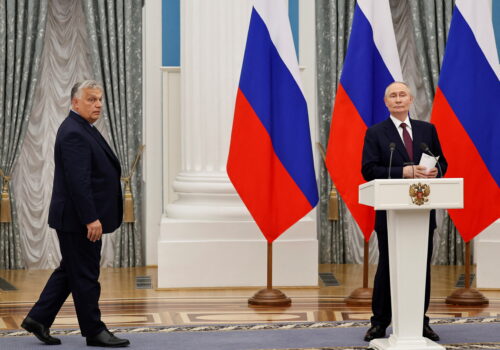On November 7, US President Donald Trump will host Hungarian Prime Minister Viktor Orbán at the White House. There, Trump could do something unexpected and, ultimately, to the advantage of his own agenda: demand Orbán stop being an obstacle to Ukraine’s European Union (EU) accession efforts.
When it comes to the EU’s mostly aligned position on Ukraine and Russia, Hungary stands as the biggest outlier. Orbán has repeatedly echoed Russian talking points about Ukraine. And while other EU member states have worked to wean themselves off Russian energy, Budapest has deepened its dependency on Moscow, providing more than five billion euros to Russia’s tax revenues since the Kremlin launched its full-scale invasion in February 2022.
Hungary has also both delayed and derailed EU-wide efforts. The EU’s decision-making procedures, which require unanimity on key issues, provide Hungary ample opportunity to delay or veto EU action. Budapest, for example, is almost always among the last holdouts to agree to place new sanctions on Russia. For months, Orbán delayed the fifty-billion-euro package that the EU prepared for Kyiv, before finally relenting in February 2024 after receiving some concessions on its access to EU funds that had been frozen over Budapest’s rule-of-law violations.
Even if it is a long way off, Ukraine’s EU membership is in the US interest.
In addition, Hungary has been blocking Ukraine’s bid for EU membership since the bloc opened accession negotiations with Kyiv in December 2023. Orbán has continued to block progress despite the European Commission affirming Ukraine’s readiness earlier this year and stating that there are “no objective reasons” for the blockage. The Commission on November 4 reiterated that Kyiv had met the conditions required to open negotiating chapters, despite Hungary’s veto.
As a result, the EU must move increasingly without Hungary in a nonofficial capacity. For example, the European Council opened accession negotiations with Ukraine in the December 2023 Council meeting only after Orbán dropped his veto by physically leaving the room when the decision came to a head. The Council has continued to resort to holding discussions on Ukraine without Orbán to avoid the political theater of a Hungarian veto on Council decisions. At the last European Council meeting in October, Orbán skipped the conversation on Ukraine entirely.
That the EU has been able to navigate Hungary’s intransigence to secure nineteen rounds of sanctions packages, provide financial support for Ukraine, and grant Kyiv EU candidate status is a feat of diplomatic prowess for the bloc’s leaders, who have used significant financial carrots and sticks to secure Orbán’s reluctant acquiescence.
But the lack of unanimity does a disservice to Ukraine, to Europe, and to the United States. Hungary is not always alone in its obstruction. Still, Budapest has weakened the EU’s hand at a moment when the demands that Europe step up in support of Ukraine are growing, particularly from Washington.
The White House should be clear-eyed about the fact that, despite Trump’s chumminess with Orbán, he has been the roadblock to the action the United States is demanding from Europe. Especially on the provision of financial assistance to Ukraine and advancing Ukraine’s EU membership, Orbán is the problem.
At Friday’s meeting in Washington, Orbán will seek to strengthen his relationship with Trump. Orbán seemed ascendent earlier this fall with the announcement of a meeting between Trump and Russian President Vladimir Putin in Budapest—a meeting Orbán heralded as a sign of his influence over the proceedings. Now, his position is tenuous. The meeting’s cancellation denies Orbán any such diplomatic weight, and he faces the added problem of potentially disastrous effects from the new US energy sanctions on Russia. He will head to Washington looking to secure desperately needed sanctions exemptions, and he has claimed that Hungary would otherwise face an economic collapse.
This means Trump has leverage. The Trump team should press Orbán to stop playing spoiler and allow Europe to take the meaningful action it needs to as Ukraine’s biggest backer. So in exchange for any sanctions relief or economic deals, Orbán’s White House visit would be a perfect opportunity to end Budapest’s obstruction of Ukraine’s EU accession progress.
Even if it is a long way off, Ukraine’s EU membership is in the US interest—and in Trump’s interest, as it would advance his goal of a lasting peace in Ukraine and help facilitate commercial deals for the United States. Ukraine’s integration into the EU’s single market would greatly expand Kyiv’s economic potential. US investments in Ukraine, through the US-Ukraine Investment Fund, would very likely stand to gain if Kyiv received the associated benefits of EU membership in the future. Further, Ukraine’s progress on the path to membership would provide the necessary reforms to keep the country stable and give a clear signal that Europe is bearing the burden of support for Kyiv, a frequent demand from Washington.
Trump has heard this line of reasoning before and picked up on the issue. At the White House meeting with seven European leaders in August, Trump confronted Orbán about his opposition to Ukraine’s EU membership in an impromptu phone call. With Orbán in town, it is the right moment to raise the issue again. Getting Orbán to drop his opposition to Ukraine’s accession would be a diplomatic feat for the White House, highlight the influence Trump has over other world leaders, and represent a strategic coup for Ukraine, Europe, and Washington.
Of course, Orbán has skirted promises before, and Trump may want to cut his friend some slack. But putting the issue front and center at Friday’s meeting will be an important move to show that Washington is watching Europe’s stepped-up efforts on defense and support for Ukraine, and that Trump expects even the most troublesome EU member states to get out of the way of this progress.
James Batchik is an associate director at the Atlantic Council’s Europe Center.
Further reading
Tue, Sep 2, 2025
Hungary has alternative energy options but chooses to rely on Russia
UkraineAlert By
Ukraine’s recent strikes on the Kremlin's Druzhba oil pipeline are not only an attack on Russia’s war economy. They are also a wake-up call for Hungarians highlighting the role being played by their country in the funding of Russia’s invasion, writes Aura Sabadus.
Mon, Aug 4, 2025
What a new nuclear deal with Hungary means for US influence in Europe
EnergySource By Jennifer T. Gordon
Hungarian and Polish firms agreed to build up to ten US-designed small modular reactors. The deal could signal a step toward bringing Hungary closer to the US and EU.
Fri, Oct 25, 2024
Hungary’s Russian oil deal threatens EU solidarity
EnergySource By
By striking a deal to resume Russian oil transit through Ukraine, Hungarian oil and gas company MOL undermines Europe's collective action against Russia. The European Union must respond quickly and decisively with solidarity to close sanctions loopholes.
Image: US President Donald Trump and Hungary's Prime Minister Viktor Orban shake hands as they pose for a photo, at a world leaders' summit on ending the Gaza war in Sharm el-Sheikh, Egypt, October 13, 2025. Yoan Valat/Pool via Reuters.




